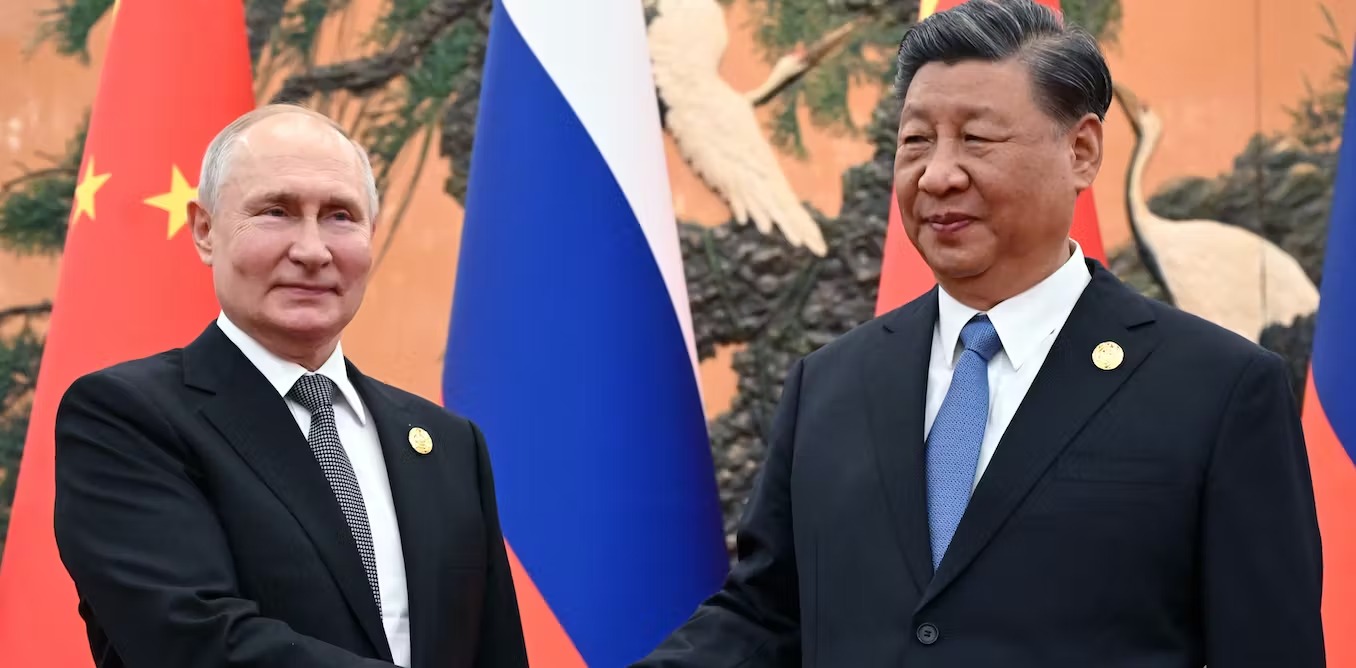During the conflict between Hamas and Israel in Gaza, many nations have tried to maintain a neutral stance by not explicitly supporting either side. But despite attempts at balanced commentaries at the top of business and politics, there has been evidence of rising antisemitism in many countries. One of these has been China.
This has come as a surprise. Since 2010, China’s political and economic ties with Israel have grown substantially. This includes a dramatic increase in Chinese tourism to Israel, academic links and investment in Israeli science and technology from large Chinese companies such as Baidu, Alibaba and Ping An.
Israel is also important to the Belt and Road Initiative, the massive Chinese overseas investment scheme that has funded construction in the Israeli port of Haifa.
But now – at a government level – there is friction between Beijing and Jerusalem over China’s refusal to condemn Hamas’s actions and formally declare it to be a terrorist organisation. Israel is also angry and dismayed at what it perceives as Beijing’s inaction over a rise in online antisemitism in Chinese cyberspace.
But this growth of antisemitism is not connected to China’s official position on the war between Hamas and Israel, which is entirely consistent with China’s international relations under Xi. Beijing has tended to avoid formally taking sides in conflicts, instead preferring to play the “honest broker” – albeit offering solutions that differ to those of the west.
Examples include China’s immediate invitation to the new Taliban rulers in Afghanistan to visit China and talk about the country’s involvement in the Belt and Road Initiative after the US withdrawal in 2021. Likewise, China’s emphasis upon impartiality over the Russian invasion of Ukraine, and its proposal of a 12-point peace plan.
But in the Israel-Palestine situation, China took a very pro-Palestinian position from the late 1940s to the 1980s. Since then, it has continued to favour a two-state solution despite its warmer relations with Israel from 2010.
Western and Asian antisemitism compared
Antisemitism in China and east Asia is different to how it is generally understood in Europe. In Europe, antisemitism is a unique discourse of hatred against Jewish people. It draws upon a long history of persecution and was heavily embedded within Christianity, culminating in the Holocaust.
Jewish people were “othered” as troublemakers and disrupters. Antisemitic tropes further positioned them as plotting world domination and engaging in cultist practices.
In contrast in East Asia, Jews and Israel have tended to be attached to a positive image of western modernity and achievement. This results in a widespread form of positive stereotyping known as “philosemitism”.
Philosemitism, the opposite of antisemitism, is the attachment of desirable and admirable characteristics to Jewish people and Israel. Chinese philosemitism includes positive notions of Jewish political governance, national identity, moral refinement, advanced civilisation and a will to survive.
These beliefs go back to the arrival of Jewish traders and investors in China in the 19th century. Today, such beliefs are transferred to a collective quality admired in Jews and the state of Israel. This culminates in an embodied image of heightened intelligence, wealth and a strong focus upon the family, with Israel being regarded as brave and innovative.
Philosemitism has been able to prosper in East Asia and operates as a convenient platform for Israeli international relations. It’s a form of soft power that is often referenced (and welcomed) by both Israeli and East Asian political actors in high-level diplomatic interactions.
Falling out of friendship
But stereotypes can very quickly switch between xenophilia and xenophobia as a result of sudden changes in the wider context. The antisemitism we see in China now is largely an inversion of philosemitism. This change was triggered when philosemitic stereotypes began to be threatening rather than useful to Chinese nationalism.
Specifically, the current Gaza conflict affirmed Israel’s connection to the US. This positioned the country as part of a perceived western “plot” to undermine China and promote US dominance. To many in China, Israel and Jewish people became part of a cluster of behaviours and beliefs associated with conspiratorial discourse about a threatening western axis.
Support for Hamas and Anti-Semitism: Social networks in China During the War in Israel
— INSS (@INSSIsrael) October 17, 2023
INSS researchers from the Glazer Israel-China Policy Center write:
China’s social media trends amidst the outbreak of war in Israel provide troubling insights into the initial sentiments of… pic.twitter.com/Oa5GmKKh4R
This links to other nationalist conspiratorial beliefs in China, attached to issues as diverse as constructing COVID-19 as part of a US plot against China, and the Russia-Ukraine war being a US-instigated conflict designed to threaten China and Russia. In cyberspace, these have easily become mixed up with older, European-style antisemitic tropes, and grown substantially.
Conspiracies tend to become more salient during times of increased social instability, with their appeal connected to an individual’s perceived lack of control. These sorts of discussion have risen in Chinese cyberspace during a time when the country’s economy is potentially undergoing a downturn – a situation uncomfortably similar to the rise of antisemitism in 1920s and 1930s Europe during the Great Depression.
While the Chinese internet is tightly controlled, issues discussed online tend only to be addressed if they are in some way threatening the authority of the Chinese Communist Party, or could potentially cause social unrest. With very few Jewish people to directly persecute, antisemitism does not pose an immediate threat to Chinese society. The wider conspiratorial discourses it is part of are also generally in support of nationalist ideology. For both of these reasons, the Chinese state has not intervened to prevent this antisemitism.
It’s important to rethink how we understand antisemitism in the Asian context. In the west, it is typically seen as a unique discourse of hatred in Europe rather than a form of racial stereotyping, as it is in Asia. The latter reflects a general lack of awareness about the dangers of positive stereotypes and how easily these can be upended.
Together with other scholars, I have previously warned that encouraging philosemitic discourse in East Asia is dangerous. So, the “surge” in antisemitism in Chinese cyberspace hasn’t come as a surprise to those of us who study this phenomenon in Asia. Jewish stereotypes have been growing over the past decade in China, but largely as philosemitism, so were not seen as a concern. This is now changing.



 Sydney Braces for Pro-Palestine Protests During Israeli President Isaac Herzog’s Visit
Sydney Braces for Pro-Palestine Protests During Israeli President Isaac Herzog’s Visit  Antonio José Seguro Poised for Landslide Win in Portugal Presidential Runoff
Antonio José Seguro Poised for Landslide Win in Portugal Presidential Runoff  Trump Says “Very Good Talks” Underway on Russia-Ukraine War as Peace Efforts Continue
Trump Says “Very Good Talks” Underway on Russia-Ukraine War as Peace Efforts Continue  U.S.-India Trade Framework Signals Major Shift in Tariffs, Energy, and Supply Chains
U.S.-India Trade Framework Signals Major Shift in Tariffs, Energy, and Supply Chains  Trump Slams Super Bowl Halftime Show Featuring Bad Bunny
Trump Slams Super Bowl Halftime Show Featuring Bad Bunny  Bosnian Serb Presidential Rerun Confirms Victory for Dodik Ally Amid Allegations of Irregularities
Bosnian Serb Presidential Rerun Confirms Victory for Dodik Ally Amid Allegations of Irregularities  Trump’s Inflation Claims Clash With Voters’ Cost-of-Living Reality
Trump’s Inflation Claims Clash With Voters’ Cost-of-Living Reality  Ghislaine Maxwell to Invoke Fifth Amendment at House Oversight Committee Deposition
Ghislaine Maxwell to Invoke Fifth Amendment at House Oversight Committee Deposition  Trump Backs Nexstar–Tegna Merger Amid Shifting U.S. Media Landscape
Trump Backs Nexstar–Tegna Merger Amid Shifting U.S. Media Landscape  Trump Signs Executive Order Threatening 25% Tariffs on Countries Trading With Iran
Trump Signs Executive Order Threatening 25% Tariffs on Countries Trading With Iran  Trump Allows Commercial Fishing in Protected New England Waters
Trump Allows Commercial Fishing in Protected New England Waters  Japan’s Prime Minister Sanae Takaichi Secures Historic Election Win, Shaking Markets and Regional Politics
Japan’s Prime Minister Sanae Takaichi Secures Historic Election Win, Shaking Markets and Regional Politics  Trump Congratulates Japan’s First Female Prime Minister Sanae Takaichi After Historic Election Victory
Trump Congratulates Japan’s First Female Prime Minister Sanae Takaichi After Historic Election Victory  India–U.S. Interim Trade Pact Cuts Auto Tariffs but Leaves Tesla Out
India–U.S. Interim Trade Pact Cuts Auto Tariffs but Leaves Tesla Out  Bangladesh Election 2026: A Turning Point After Years of Political Suppression
Bangladesh Election 2026: A Turning Point After Years of Political Suppression  Israel Approves West Bank Measures Expanding Settler Land Access
Israel Approves West Bank Measures Expanding Settler Land Access  Trump Lifts 25% Tariff on Indian Goods in Strategic U.S.–India Trade and Energy Deal
Trump Lifts 25% Tariff on Indian Goods in Strategic U.S.–India Trade and Energy Deal 

































